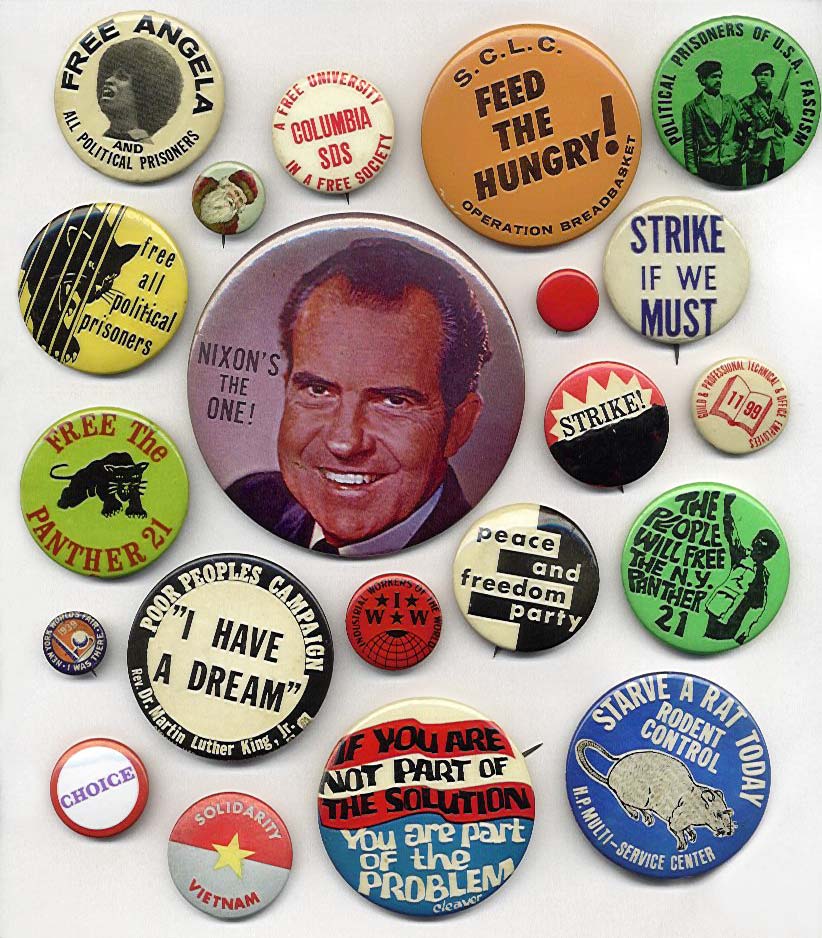
- The original 1968 Strike button. These were gathered up hurriedly from
some other strike elsewhere (obscured by black magic marker).
- A Columbia SDS (Students for a Democratic Society) button.
- The small red button warn by plainclothes and undercover police to
identify themselves to one another during the first arrest (to avoid
clubbing each other). In subsequent arrests, students wore them too.
- The Strike If We Must button appeared after the first arrest, while
talks went on in various forums over what would be done about the students'
demands, punishing the students, gym construction, and so on. It was worn
by moderates sympathetic to those already striking.
- A Local 1199 button, emblematic of the kind of widespread labor organizing that took place in the wake of the strike (in this case, for a diverse, then-progressive labor union).
John O'Brien, who was present at the Columbia events of 1968 and who is an authority on progressive political buttons, reported in May 2003:
The button with the black ink over the rest of the wording (white and red color) only showing "Strike" is a Vietnam Peace button issued by the Student Mobilization Committee (SMC) for the April 26th Strike held in 1968 around the U.S. against the Vietnam War.The little red button was issued in Dec. 1967 for the "Stop The Draft Week" protests at the Whitehall Induction Center. It was issued by the YSA [Young Socialists Alliance] in response to the NYC Police Department having a larger red button made to identify the many hundreds of plain clothes police around that week of daily protests to "shut down the induction center". There was a later larger version made that was sold by the YSA in 1970-1973.
Other buttons shown... Yes, that's a genuine IWW (Industrial Workers of the World, "Wobblies") button below Nixon's chin. The Panther 21 were the local counterpart of the Chicago 7: 21 Black Panthers accused of plotting to blow up Macy's, eventually acquitted; shown on the button at upper right are Panther founders Bobby Seale and Huey P. Newton ("Free Huey!"). The Panthers were a regular fixture at the Columbia gate (as were the Young Lords a bit later), selling literature and recruiting. Angela Davis was accused of complicity in the 1970 courtoom escape attempt of George Jackson (author of Soledad Brother: The Prison Letters of George Jackson) in which the judge was killed; she was acquitted too and is now on the faculty at UC Santa Cruz ("the only professor who was once on the FBI's 10 Most Wanted list"). George Jackson was killed in prison in 1971. Huey P Newton was killed in 1989. Malcom X, by the way, was killed in 1965 in the Audubon Ballroom in Harlem, now a Columbia biotech research building (Columbia restored and preserved the historic facade and built the new facility behind it).
The Strike If We Must button appeared after the first arrest, while talks went on in various forums over what would be done about the students' demands, punishing the students, gym construction, and so on. It was worn by moderates sympathetic to those already striking. Eventually there was a second building occupation and mass arrests.
Free Bobby Seale (Black Panther Party); They Shall Be Served; March on Washington (button union made!... Allied Printing Trades Council, New York), Create 2-3 Many Columbias, Warmth, May Day, District 65.
The "They Shall Be Served" button was worn in the early 60s in support of the black students who sat in at Southern lunch counters. The Warmth button was passed out by people who wanted everybody to “don't worry, be happy”, which for some of us was not on the menu because of the war and other atrocious things going on. District 65 was another union that was organizing on campus. In fact I myself was an organizer in Butler Library, collecting enough pledge cards for an election to be held, but the union lost.
Frank da Cruz / Columbia University 1968 / Jun 2001 / Links updated Jan 2008 / New buttons Nov 2013
